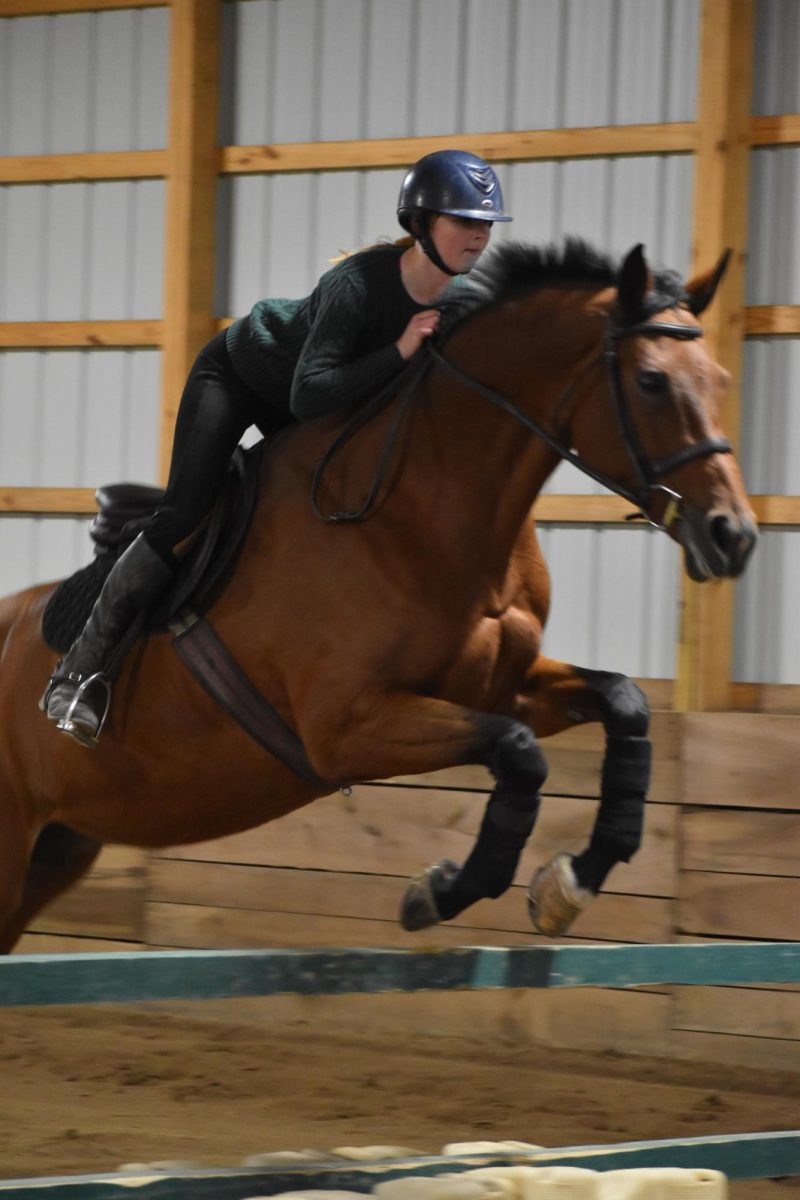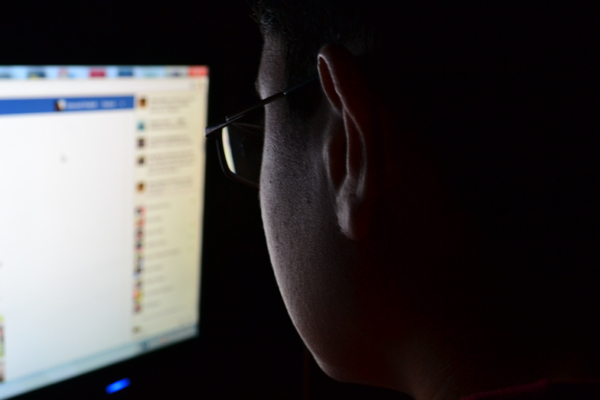
“I’m gonna murder this girl Ellie Boyer for what she did.”
Last school year, such a comment joined hundreds of other posts that streaked the Twitter pages of her classmates. Junior Ellie Boyer’s reporting of a cheating incident that occurred a week before final exams had ended the hopes of desperate students, who, frustrated by Boyer’s honesty and its potential effect on their test scores, turned to threats, blame and hatred.
They terrified her with death threats. They robbed her sense of security. They were responsible for her absence during the final week of school.
“I cried when I first saw those posts,” Boyer said. “I couldn’t believe how cruel people could be. I didn’t expect it. But then I was scared, because when someone threatens you, it’s terrifying. In hypothetical situations, you never truly understand how serious it is.”
Boyer, a girl who was never one to crave the spotlight, said she suddenly found herself as the center of people’s gossip.
“My reputation was being trashed,” she said. “I never thought it was something that was important to me, but once people made me the enemy, things changed. Everybody knew my name. Everybody knew who I was. All these strangers hated me and there was nothing I could do to change that.”
Boyer’s problem is not an uncommon one. According to a recent statistic from the National Crime Prevention Council, 42 percent of children from the ages of 12 to 18 have been bullied while online. One in four has had it happen more than once.
Valerie Weesner, a clinical psychologist at the Center for Child and Family Therapy, said cyberbullying—the use of the Internet and related technologies to harm others in a deliberate, repeated and hostile manner—has revolutionized the field of bullying.
“Cyberbullying is so much quicker than the old-fashioned way,” she said. “More people can get involved. Even complete strangers could join in if they found the specific page.”
Online Attack
Last school year, Boyer attended a study session to prepare for the upcoming chemistry final.
She said, “I remember this student handed me a white slip of paper and told me, ‘Hey, this will help you on the final.’ I glanced at it and I saw little letters labeled A through E. They were the answers to the test.”
The answers pitted her undying morals against her need to excel. Ultimately, Boyer said she knew which would win.
“I told myself, ‘I don’t want this. It’s not ethical, and I can’t be a part of it.’ So the next day, I found my chemistry teacher in her room during passing period and I told her someone had stolen the answers to the final and was distributing them to other students. She was skeptical at first, but I was persistent enough to finally convince her,” Boyer said. “But while we were talking, a boy from another class approached her desk, and I guess he overheard what we were discussing.”
Boyer said she thought little of what the other student was capable of. Instead, she walked out of the room believing her good deed had helped define her moral character.
But no good deed goes unpunished.
“Originally, I had received some texts from friends, asking me if the rumors were true. That was when I realized that the boy had told his entire class what I did and by the afternoon, everyone knew,” Boyer said.
Days later, they began to appear. Comments by the dozens were plastered across the social networking site Twitter, ranging from tactless vulgarity to threats on her life.
“Now I’m gonna fail my chemistry final. Thanks, Ellie Boyer,” one student said. “She’s crazy for what she did,” another wrote.
In the aftermath, Boyer eventually felt the only option left was to escape the harassment from fellow classmates.
“After telling my mom what happened, I didn’t go to school the next day,” she said. “We visited the principal and he said it was probably best to not attend school for a little while because, by that point, I had seen death threats made by other students.”
According to Weesner, students often fail to realize that the repercussions for bullying while online can be just as severe as those for bullying in person.
“Students often restrain what they say at school because they know they can be held accountable,” she said. “But I don’t think people understand how much worse it is to post insults online. They don’t think it can get traced back to them, but it can.”
New York is pursuing legislation to better protect citizens from cyberbullying.
What’s in a Name?

In the fall of her freshman year, sophomore Jasmine Sendon became one of the 18 million people to join the website Formspring, a question-and-answer-based social website that grew popular because of its option to post anonymous comments. Hoping it would simply be another way to branch out to friends and stay in touch with those in other states, Sendon joined her friends in setting up an account.
She said she thought little of how the comments posted on her wall would be from anonymous users, capable of unleashing devastating abuse. She thought little of how it could hurt her and mock her insecurities for weeks to come.
A month later, her Formspring page had been consumed with not only insults about her appearance, but also with comments about the insignificance of her life.
“I just stared at the screen for a while,” Sendon said. “The comments hit me hard. I started to feel worthless, and I convinced myself that the remarks had a grain of truth to them. Even though I tried to just ignore the ones laced with cruelty, they always lingered in the back of my mind. I was always wondering, ‘Who else is thinking that?’”
Perhaps the degree of malice of these comments links to the site’s anonymity policy, which, according to Sendon, opened a gateway for users to post any comment without the fear of being held accountable.
“When it’s anonymous, people can say anything, and nobody will know who it is,” Sendon said. “If they had to include a name, they’d probably be kinder and less likely to write such horrifying comments.”
According to Weesner, anonymity on the internet has indeed led to an increase of severity in remarks.
“People are meaner when they don’t have to own up to their actions,” she said. “They’re freer with their words and harsher in their meaning.”
For months, Sendon said she felt the cyberbullying slowly unravel her already delicate sense of self-worth.
“I couldn’t trust anyone anymore and even though I tried to shrug the comments off, it just bothered me so much,” she said. “It distracted me from living my life.”
Weesner said that even for the strong-willed, negative words can prove to have a lasting effect.
“It’s tremendously difficult to shrug off,” Weesner said. “Once you see it, it’s in your brain and it just sits there. It’s so personal and you know it’s directed at you. You’re left wondering, ‘How valid is the comment made? How much do I need to take it to heart?’ All the comments start to build on each other and it’s difficult to undo the damage.”
In recent events, Jamey Rodemeyer, a 14-year-old boy from Buffalo, NY, had faced ridicule on his Formspring page for a year due to his bisexuality.
“Jamie is stupid, fat, gay and ugly. He should die!” one post read. Another said, “I wouldn’t care if you died. No one would. So just do it. It would make everyone (way happier)!”
On Sept. 18, Rodemeyer succumbed to their wishes. His suicide sparked national attention. “I always say how bullied I am, but no one listens,” he wrote, just a week before his suicide. “What do I have to do so people will listen to me?”
Zogby poll says 60 percent of people believe Internet anonymity makes us less civil.
Lean on Me
According to Weesner, support from friends and family is absolutely necessary, for the research on bullying puts an emphasis on the bystander.
She said, “On the surface level, they can guide the victim away from hearing and seeing all the cruelty so he or she can get a break from it. They can counter the arguments. They can provide emotional support.”
Weeks after Sendon’s first negative comment, sophomore Kristyn Card began to notice what her friend was enduring. Infuriated by people’s cruelty, Card launched a counterattack.
“I began to comment on her wall, telling people to stop,” Card said. “If you wouldn’t do it in person, you shouldn’t do it online.”
But her efforts had the opposite effect. Soon after, the attackers made their way to her wall, determined to punish her for belittling their spite.
“They started commenting about my appearance too,” Card said. “They also said things like, ‘Why are you friends with Jasmine? She’s so fat and ugly.’ And in response, I would say, ‘No, she’s not. Have you seen her? She’s gorgeous. And she doesn’t need to be told otherwise.’ Someone needed to stick up for her. I didn’t care what they wrote about me because I knew it was anonymous and I knew they wouldn’t say it to my face.”
“If someone receives help and support, the long-term effects are going to be having a better buffer when bullied,” Weesner said. “When there’s no help or support, the long-term effects are poor self esteem, depression, and higher anxiety.”
Looking back, Boyer said she feels no regret for what she did, and if given the same opportunity, she would repeat her actions. Nevertheless, the effects of her decision proved devastating, and she said she is thankful that Carmel enforces an environment with no tolerance for cyberbullying.
Boyer had initially felt convinced that she was alone, isolated from her peers for what she had done. But support soon arrived. During a time when she had few people to lean on, Boyer said the random acts of kindness made a lasting impact on her emotional recovery.
“I remember many people had messaged me on Facebook, telling me that they supported me for my decision,” she said. “They said they were proud of me for how I stuck to my morals. Even people I didn’t know that well offered me their support.”
For Boyer, the encouraging words from even mere acquaintances helped her past a rough time in her life.
“Don’t be discouraged by the cruelty of cyberbullying,” she said. “There will always be someone to help you make it through. You’re not alone.”


































![British royalty are American celebrities [opinion]](https://hilite.org/wp-content/uploads/2024/03/Screenshot-2024-03-24-1.44.57-PM.png)



















![Chelsea Meng on her instagram-run bracelet shop [Biz Buzz]](https://hilite.org/wp-content/uploads/2024/04/IMG_2446-1200x838.jpg)
![Review: Quiet on Set: The Dark Side of Kids TV is the long awaited exposé of pedophilia within the children’s entertainment industry [MUSE]](https://hilite.org/wp-content/uploads/2024/04/unnamed.jpg)
![Review: “The Iron Claw” cannot get enough praise [MUSE]](https://hilite.org/wp-content/uploads/2024/04/unnamed.png)
![Review: “The Bear” sets an unbelievably high bar for future comedy shows [MUSE]](https://hilite.org/wp-content/uploads/2024/03/unnamed.png)
![Review: “Mysterious Lotus Casebook” is an amazing historical Chinese drama [MUSE]](https://hilite.org/wp-content/uploads/2024/03/0.webp)
![Review in Print: Maripaz Villar brings a delightfully unique style to the world of WEBTOON [MUSE]](https://hilite.org/wp-content/uploads/2023/12/maripazcover-1200x960.jpg)
![Review: “The Sword of Kaigen” is a masterpiece [MUSE]](https://hilite.org/wp-content/uploads/2023/11/Screenshot-2023-11-26-201051.png)
![Review: Gateron Oil Kings, great linear switches, okay price [MUSE]](https://hilite.org/wp-content/uploads/2023/11/Screenshot-2023-11-26-200553.png)
![Review: “A Haunting in Venice” is a significant improvement from other Agatha Christie adaptations [MUSE]](https://hilite.org/wp-content/uploads/2023/11/e7ee2938a6d422669771bce6d8088521.jpg)
![Review: A Thanksgiving story from elementary school, still just as interesting [MUSE]](https://hilite.org/wp-content/uploads/2023/11/Screenshot-2023-11-26-195514-987x1200.png)
![Review: When I Fly Towards You, cute, uplifting youth drama [MUSE]](https://hilite.org/wp-content/uploads/2023/09/When-I-Fly-Towards-You-Chinese-drama.png)
![Postcards from Muse: Hawaii Travel Diary [MUSE]](https://hilite.org/wp-content/uploads/2023/09/My-project-1-1200x1200.jpg)
![Review: Ladybug & Cat Noir: The Movie, departure from original show [MUSE]](https://hilite.org/wp-content/uploads/2023/09/Ladybug__Cat_Noir_-_The_Movie_poster.jpg)
![Review in Print: Hidden Love is the cute, uplifting drama everyone needs [MUSE]](https://hilite.org/wp-content/uploads/2023/09/hiddenlovecover-e1693597208225-1030x1200.png)
![Review in Print: Heartstopper is the heartwarming queer romance we all need [MUSE]](https://hilite.org/wp-content/uploads/2023/08/museheartstoppercover-1200x654.png)






















![Review: Ladybug & Cat Noir: The Movie, departure from original show [MUSE]](https://hilite.org/wp-content/uploads/2023/09/Ladybug__Cat_Noir_-_The_Movie_poster-221x300.jpg)

![Review: Next in Fashion season two survives changes, becomes a valuable pop culture artifact [MUSE]](https://hilite.org/wp-content/uploads/2023/03/Screen-Shot-2023-03-09-at-11.05.05-AM-300x214.png)
![Review: Is The Stormlight Archive worth it? [MUSE]](https://hilite.org/wp-content/uploads/2023/10/unnamed-1-184x300.png)


